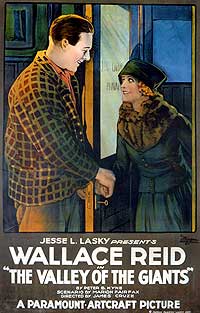 Back in November, in an installment of This Day In History’s Movies about auto-racing, I talked very briefly about the silent film star Wallace Reid, a dashing leading man best-known at the time for a series of films about fast cars. I also mentioned how Reid’s promising career (and legacy) were destroyed by a morphine addiction that began after he injured himself while shooting the film The Valley of the Giants. I had never heard of Giants until I was researching Reid, and my attempts to locate the film took me to a dead end. The film had slipped through the cracks, now just a footnote (not even a red link on Wikipedia) in the history of an actor who is himself merely a footnote in Hollywood history.
Back in November, in an installment of This Day In History’s Movies about auto-racing, I talked very briefly about the silent film star Wallace Reid, a dashing leading man best-known at the time for a series of films about fast cars. I also mentioned how Reid’s promising career (and legacy) were destroyed by a morphine addiction that began after he injured himself while shooting the film The Valley of the Giants. I had never heard of Giants until I was researching Reid, and my attempts to locate the film took me to a dead end. The film had slipped through the cracks, now just a footnote (not even a red link on Wikipedia) in the history of an actor who is himself merely a footnote in Hollywood history.
Well, small world, because The Valley of the Giants is one of the ten silent films thought to be lost to time that were recently uncovered in Russia and returned to the United States as part of an international library cooperative (a gift from the Boris Yeltsin Presidential Library to our Library of Congress).
How Russia came to have these lost prints (in pristine condition no less) is apparently entirely due to the fastidious nature of the Russians, as the Washington Post reports in their nice little article on the discovery:
More than 80 percent of American movies made in the silent era, which ran from about 1894 to 1929, no longer exist. The silver nitrate stock on which they were recorded decomposes unless stored properly, and Americans at the time didn’t value film preservation. In many cases, the only reason archivists know certain movies existed is because the titles were dutifully copyrighted.
The Soviets, however, were more diligent.
Between 1913 and 1941, about 1,300 American films were distributed in Russia, which became the Soviet Union after the 1917 revolution. While the Russians and Soviets did not appreciate all that they received – many of the films included warnings that they depicted a “moral and social situation” that was “reprehensible” – they were relatively good at making sure that what they had was kept in good condition in a state film archive.
Hop over to the Post to get the full lowdown.
Thanks to Alex for the tip.